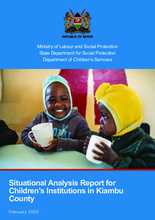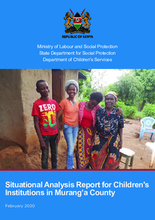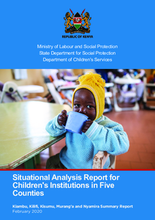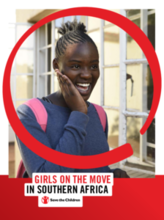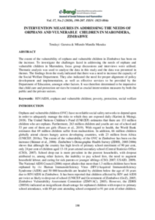Displaying 451 - 460 of 1617
The purpose of the situational analysis is to provide a snapshot of Charitable Children’s Institutions (CCIs), other private childcare institutions and Statutory Children’s Institutions (SCIs), and the children living in them in Kiambu County, Kenya.
The purpose of the situational analysis is to provide a snapshot of Charitable Children’s Institutions (CCIs) (registered and unregistered), and Statutory Children’s Institutions (SCIs), and the children living in them in in Murang’a county, Kenya.
The purpose of this situational analysis is to provide a snapshot of charitable children’s institutions (CCIs), other private childcare institutions and statutory children’s institutions (SCIs) in Kenya, and of the children living in them.
Vulnerable children and families need a strong social support network that acts as a safety net to effectively and sustainably respond to the situation of children and families at risk.
This report’s primary purpose is to recommend evidence-based strategies to improve the relevance and effectiveness of field interventions that target development outcomes for migrant girls in Southern Africa.
The Trainers Package is primarily for Government of Rwanda Child Protection and Welfare Officers, representatives of the NCPD and others who work directly with children and families on reintegration of children, including children with disabilities, from residential institutions to family care. It can also provide useful information to people working in other local government roles, for example District Disability Mainstreaming Officers and Gender &
Family Promotion Officers, as well as people working in non-governmental organizations (NGOs) or community based systems (for example, Inshuti z’Umuryango - Friends of the Family) who support children and families, and particularly those who have contact with children during the reintegration process.
No ano de 2019, o mundo foi assolado pela eclosão do novo Coronavírus com os primeiros casos detectados na China.
Medidas preventivas e de mitigação do impacto do COVID-19 nos grupos vulneráveis e de alto risco entre os beneficiários do PSSB.
This chapter reports on one such intervention, the Family Strengthening Intervention (FSI), initially developed and tested in Rwanda to improve communication and parenting in HIV/AIDS-affected families with school-age children.
To investigate the challenges faced in addressing the needs of orphans and vulnerable children in Marondera, focus group discussions and interviews were utilised. Thematic analysis was used to analyse the data in this study and the data was presented in themes.

